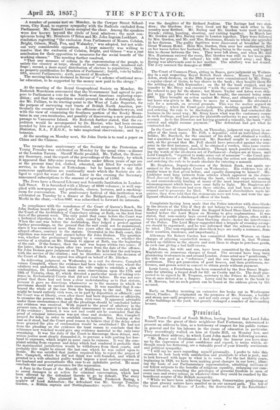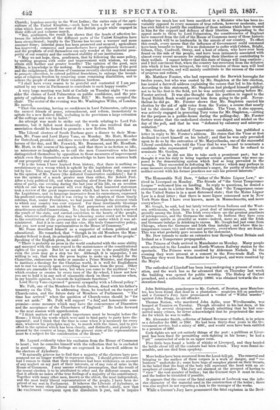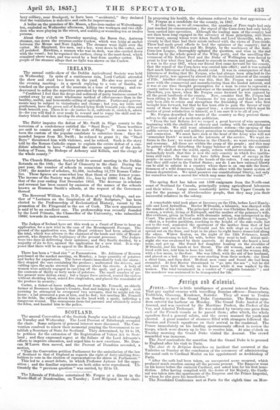Vrouintial.
The Town-Council of South Molten, having learned that Lord John Russell was the guest of their neighbour Earl Forteseue, determined to present an address to him, as a testimony of respect for his public virtues in general and for his ,labours in the cause of education in particular. They accordingly waited on him at Castle Hill, on Monday lust, and presented their address; to which Lord John made the following answer.
"Mr. Mayor and Gentlemen—I feel deeply the honour you have done me by the expression of your confidence and regard, in terms which, although much too flattering, are a valuable proof of your friendly sentiments and political sympathy. "I will say no more regarding myself personally. I prefer to take this occasion to look back with satisfaction and gratitude to what is past, and to look forward with hope to what is to come. For the last thirty years,. beginning in 1828, we have been making great changes in our laws ; altering the basis of our Parliamentary, representation, admitting millious of our fellow subjects to the benefits of religious equality, enlarging our commercial liberties, extending the privileges of personal freedom to men of every race and every colour, in whatever clime they could be reached by the beneficent sceptre of the British monarchy. "While we have been achieving these tasks, Conservative predictions of the niost gloomy nature have assailed us in our onward path. The fall of the Crown and the House of Lords ; the destruction of the Established Church; hopeless anarchyin the West Indies; the entire ruin of the agriculture of the United Kingdom,—such have been a few of the omuions dries which have stunned the ears of the British people while engaged in their difficult and toilsome march. "But, gentlemen, the result has shown that the bonds of affection between the inhabitants of the different parts of the United Kingdom have been strengthened ; loyalty to the Throne has become a warmer and more constant flame; internal peace has been preserved and secured ; agriculture has improved; commerce and manufecteees have prodigiously increased ; and the prophets of evil themselves can only wonder at the material pros
perity_of our country and the confirmed stability of our institutions. „
"May we not hope, then, gentlemen, that by following the same policy, by uniting progress with order and improvement with wisdom, we may attain still further and greater benefits? The opinion of the good, says Milton, is knowledge in the making. By consulting the opinion of the good and the enlightened, the House of Commons recently elected may find means to promote education, to extend political franchises, to enlarge the boundaries of religious freedom by removing some remaining disabilities, and to relieve the people of some of their vexatious burdens.
"I shall have every reason to be grateful and contented if I am permitted by my votes in Parliament to contribute to such happy results."
A very large meeting was held at Carlisle on Tuesday night "to consider the claims of Lord Palmerston on public confidence, and the propriety of agitating for a new Reform Bill." Mr. Sutton occupied the chair. The orator of the evening was Mr. Washington Wilke, of London. He moved,
"That this meeting, having no confidence in Lord Palmerston, calls upon the earnest friends of peace, retrenchment, and reform, immediately to agitate for a new Reform Bill, including in its provisions a large extension of the suffrage and vote by ballot."
An attempt was made to strike out the words relating to Lord Palmerston, but it failed most decisively. It was also resolved that an association should be formed to promote a new Reform Bill.
The Liberal electors of South Durham gave a dinner to their Members, Mr. Pease and Lord Harry Vane, on Monday-. Mr. Hutt, Member for Gateshead, presided ; and there were five other Members present—the heroes of the day, and Mr. Fenwick, Mr. Beaumont, and Mi.. Headlam. Mr. Hutt, in the course of his speech, said that there is no fiction so idle, no misnomer so laughable, as to call the men Conservatives who have distinguished themselves by opposition to those measures of improvement which even they themselves now acknowledge to have been sources both of our prosperity and our safety. "It is the lesson I have learned from history, that there is nothing so revolutionary as a wrong which is upheld by the legislators and consecrated by law. This may not be the opinion of my Lord Derby ; this may not be the opinion of Mr. Ferrer [the defeated Conservative candidate] ; but it was the opinion of a much greater man than either, Sir Robert Peel. After a long political life, and when standing aloof from the aims and passions of party, ono evening during the last year of his life, on an occasion which no one who was present will ever forget, that lamented statesman took a review of the great improvements which had been accomplished by the Legislature, and in language impressive from its earnestness, expressed his profound conviction that it was owing to the adoption of those timely reforms, that, under Providence, we had passed through the sternest trials to which any country was ever exposed. For those inestimable blessings we were assuredly not indebted to that purposeless and irritating obstructiveness called Conservatism. No; but to those reforms which renewed the youth of the state, and carried conviction to the hearts of the people that, whatever sufferings they may be labouring under could not be traced to the constitution of the government or the spirit under which it was administered. And it is to carry out this wise, this truly Conservative policy, that you now send your representatives to the House of Commons."
Mr. Pease described himself as a supporter of reform political and educational. He remarked, that "though in its old Members the Manchester School is dead, its principles still live, and are those of the people." Speaking of the English press, he said
" There is probably no press in the world conducted with the same ability and managed with the same regard to the maintenance of the constitutional rights of the people. But let us not shut our eyes to the possibility that even the press may go a step too far. Although it is unpopular, I am willing to say, that when the press begins to make up a budget for the Chancellor, endeavours to make or unmake a Prime Minister, and disposed to institute a theology for the Christian world, it is well for Englishmen not to rest too securely upon everything that issues from the press. Other estates are amenable to the laws, but when you come to the mythical we,' which crushes or creates by every turn of the fly-wheel, I know not how you are to hold it in any sort of reasonable check on those occasions when, in my humble opinion, it exceeds its legitimate functions."
Lord Harry \ tine expressed "general sympathy with a Liberal policy."
Mr. Palk, one of the Members for South Devon, dined with his father's tenantry on the 17th. In addressing them, he touched on the topics of Church-rates, and the future duty of Members of Parliament. "The time has arrived" when the question of Church-rates should be "for ever set aside." Mr. Palk will support "a fair: and honourable compromise—some measure which may have the concurrence of Dissenters and the acceptance of the Churchmen of England." He looks forward to the next session with apprehension.
"I think matters of vast public importance must be brought before the Rouse; I think the words which were said to bind party to party have disappeared; and I think that the time is come when it is necessary for every man, whatever his principles may be, to march with the times, and to give effect to the opinion which has been clearly, and distinctly, and plainly expressed by the country at large, that the present state of the representation must be a subject for the consideration of the House."
Mr. Layard evidently takes his exclusion from the House of Commons to heart ; but he consoles himself with the reflection that he is excluded in good company. His feelings are expressed in a farewell address to the electors of Aylesbury.
"It naturally grieves use to find that a majority of the electors have pronounced me no longer worthy to represent them. I should grieve still more had I reason to think that their confidence had been withdrawn on account of any neglect on my part of their interests, or of any vote of mine in the House of Commons. I may assume without presumption, that the result of the recent election is to be attributed to other and far different causes, and that it affords no index of the true feelings of a majority of the constituency. Together with many other men, known as the ablest, the most independent, and the most truly liberal representatives of the people, I have been deprived of my seat in Parliament. It behoves the Liberals of Aylesbury, as it behoves many other Liberal constituencies, to reflect calmly, now that tie excitement consequent upon the dissolution is past, and to inquire whether too much has not been sacrificed to a Minister who has been invariably opposed to every measure of true reform, however moderate, and has ever failed to justify the confidence of those nations which have trusted in him for the support and defence of their liberties. Responding to the appeal. made to them by Lord Palmerston the constituencies of England have removed from the roll of the House of Commons many of these historic names which will be as landmarks in the annals of our country. To effect this result, every means that the influence of Government could command have been brought to bear. His no dishonour to suffer with Cobden, Bright, Gibson, Clay, Cardwell, Otway, and a host of others, who have ever been found on the side of the people, and have been intimately associated with almost every recent measure for enlarging their liberties or contributing to their welfare. I cannot believe that this state of things will long continue ; and I feel convinced that, when the country has recovered from the delusion into which it has been betrayed, the very exclusion of those men will lead to important results, and will mainly contribute to the success of the cause of progress and reform."
Mr. Matthew Forster, who had represented the Berwick boroughs for twelve years, but who was ousted by Mr. Stapleton at the late election, has issued a farewell address explaining the causes that led to his defeat. According to this statement, Mr. Stapleton had pledged himself publicly not to be the first in the field, yet he was actively canvassing before Mr. Forster arrived. It was also thought that his position in regard to the Royal British Bank would prevent him from going to the poll. Nevertheless he did go. Mr. Forster shows that Mr. Stapleton carried his election by the aid of split votes from the Tories ; a course that nearly led to the election of the Tory candidate. The Vicar' it also appears, was actively engaged in procuring Tory votes for Mr. Stapleton,—sitting for the purpose in a public-house during the polling-day. Mr. Forster further states that the undeclared electors were duped and misled on the day of the poll, and that he was "defeated by calumny and misrepresentation."
Mr. Gordon, the defeated Conservative candidate, has published a letter in reply to Mr. Forster's address. He states that the Vicar at first declined to exert himself on his behalf; and that he was only prevailed upon to do so by the entreaties of Mr. Marjoribanka, one of the successful Liberal candidates, who told the Vicar that he was bound to nominate a candidate who represented "purity of election." But he refused to nominate Mr. Gordon' "as he did not like to take such a prominent part; but he thought it was his duty to bring together certain gentlemen who were opweed. to the demoralizing system which had so long prevailed in the borough. They succeeded in defeating Mr. Forster; which nia,y perhaps in some measure account for that gentleman's anger, for purity of election did neither accord with his former practices nor suit his present interests."
The Honourable Neil Dow, "father of the Maine Liquor Law," arrived in Liverpool on Monday. The friends of "the Great Temperance League" welcomed him on landing. In reply to questions, he denied a statement made in a letter from Mr. Gough, that "the Temperance cause in the United States is in a most distressed state ; that the Maine Liquor Law is a dead letter ; that there is more liquor consumed now in N ew York State than I have ever known, more in Massachusetts, and more everywhere."
Mr. Gough, he said, had but lately 'returned from Indiana and the Western settlements, where there is a great deal of intemperance, more especially among the Irish. The Irish every where are the greatest practisers of intemperance, and the Germans the same. In Indiana they have corn and potato spirits as plentiful as water—indeed, more so ; and the Irish and Germans indulge in drinking to excess. Mr. Gough had just come from Chicago, where the Germans and Irish thus indulge ; and where this intemperance causes vice and crime and poverty, everywhere they are found. This was what probably gave occasion to the statement.
Mr. Dow intends to make an extensive tour through Great Britain and Ireland as a Temperance propagandist.
The Princes of Oude arrived in Manchester on Monday. Many people were attracted to the London and North-Western Railway station by the spectacle. The Princes were received by Alderman Nichols. In the i evening they were present at a concert n the Free-trade Hall. On Thursday they went from Manchester to Liverpool, and were received by the Mayor.
The cathedral of Llandaff has been long undergoing a process of restoration, and the work has so far advanced that on Thursday last week the building was opened for public worship. The Bishop of Oxford preached, and a collection of nearly 10001. was obtained towards the restoration-fund.
John Bebbington, gamekeeper to Mr. Corbett, of Beeston, near Manchester, has been found shot dead in a plantation : suspicion fell on poachers ; and a Coroner's Jury have pronounced a verdict of "Wilful murder" against John Blagg, an old offender.
Thomas Nation, who murdered John Aplin, near Wiveliscombe, was hanged at Taunton on Tuesday. Though attended in his last days, at his request, by several clergymen, and though admitting that he had committed many crimes, he never acknowledged that he perpetrated the murder for which he was to suffer.
Mr. Alexander Smith, collector of Inland Revenue at Oxford, is in prison as a defaulter for 6001. or 7001. He had been thirty-four years in the Government service, had a salary of 400/., and would soon have been entitled to a pension of 200/.
Cock-fights are not yet entirely things of the past : a publican at Liverpool has been fined for permitting cock-fighting in his house ; he had a " pit " constructed of sods in an upper room.
Fire little boys found a bottle of whisky at Liverpool, and they handed the bottle about till all the contents had been drunk. They were found insensible, and one died from apoplexy.
More bodies have been recovered from the Lund-hill pit. The removal and bringing, to the surface of these corpses is a work of danger, and "volunteers" ' undertake it; some have bags of camphor placed on their breasts, in the belief that the heat of the body will surround the head with an atmosphere of camphor. The Jury are alarmed at the prospect of having to " view " the vast number of bodies ; but the Coroner says it must be done, and the bodies be identified if possible.
It appears that the cause of the fatal explosion at Leet■rook was the inferior character of the material used in the construction of the boiler; there was also neglect in not reporting a leak to the manager of the works.
While a Coroner's Jury have pronounced the fatal explosion in the Bred
bury colliery, near Stockport, to have been "accidental," they declared that the ventilation is defective and calls for improvement.
A boiler on the premises of Mr. Mason' afire-iron-maker at 'Wolverhampton, exploded on Wednesday afternoon, killing two workmen and two children who were playing in the street, and scalding or wounding ten or twelve persons.
About three o'clock on Thursday morning, the Baron Osy, Antwerp steamer, ran down the revenue-cutter Curlew, which was lying at anchor between the Mouse and Nore Lights. The steamer went right over the cutter. Mr. Shepherd, five men, and a boy, went down in the cutter, and all perished. Hawkins, a seaman who was on deck, was also carried down with the vessel; but he re.gained the surface clung to the mast-head, which remained above water, and was saved by a boat from another cutter. The people of the steamer allege that no light was shown on-the Curlew.


























 Previous page
Previous page